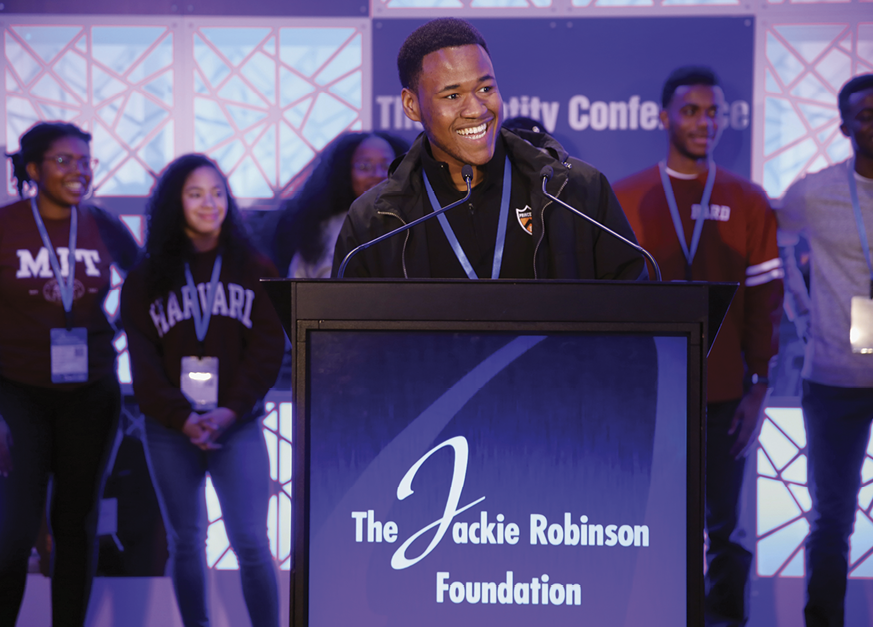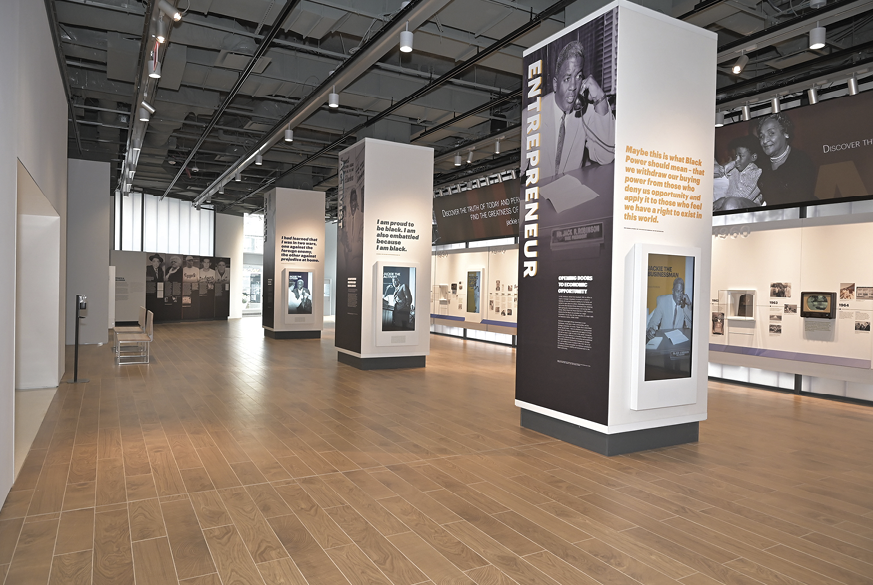- Home
- Media Kit
- MediaJet
- Current Issue
- Past Issues
- Ad Specs-Submission
- Ad Print Settings
- Reprints (PDF)
- Photo Specifications (PDF)
- Contact Us
![]()
ONLINE
![]()
ONLINE

Promoting Equal Opportunity
Editors’ Note
Martin Edelman is one of the founders of the Jackie Robinson Foundation. A former attorney for Jackie Robinson, he is a tireless advocate for the Foundation and its mission. Edelman is one of only five people to have received JRF’s Founders Award. A graduate of Princeton University and Columbia Law School, Edelman has been a partner with Paul Hastings, LLP, a New York City based law firm, since 1972; in January 1994 he became an Of Counsel of the firm. Edelman has more than 40 years of experience and concentrates his practice on real estate and corporate transactions. The focus of Edelman’s practice has been large, complex transactions. He has been involved in all stages of legal development of pioneering financial structures, including participating mortgages, institutional joint ventures in real estate, and joint ventures between U.S. financial sources and European real estate companies. He has also done extensive work in Europe, Canada, Mexico, and recently in Japan. Edelman is on the Board of Directors of Manchester City Football Club, Equity Office, Global Foundries, and Aldar Investments, an Abu Dhabi public company. He is an advisor to Grove Real Estate Partners, The Related Companies, Fisher Brothers, and Mubadala, the strategic investment arm of the Government of Abu Dhabi. Edelman resides in New York and is the father of three and grandfather of six.

Jackie Robinson Foundation 2018 Mentoring & Leadership
Conference in New York City
What interested you in becoming involved with the Jackie Robinson Foundation?
As a young lawyer in the 1960s, I met Jackie Robinson in connection with his cofounding of Freedom National Bank in Harlem and later became his lawyer. After his death in 1972, I worked with Rachel Robinson to establish the Jackie Robinson Foundation to perpetuate her husband’s legacy, which is grounded in his dedication to promoting equal opportunity. I was and remain stirred by both Jackie and Rachel Robinson’s staunch commitment to leveling the playing field throughout society and to serving those less fortunate. I was at Rachel’s side when she founded the organization and am still a board member.
How do you define the mission and purpose of the Foundation?
The Jackie Robinson Foundation (JRF) was established in 1973 to continue the Robinsons’ work around creating opportunities that lead to first class citizenship for all Americans. Guided by the universal truth that education is the key to advancement, we turned to education. At the time, U.S. colleges were beginning to integrate in significant numbers and there was a need to provide minority students with financial assistance as well as strategies, particularly for navigating PWIs (predominately White institutions), to ensure their success in college and professionally.
Today, under a broader umbrella of perpetuating the legacy through education and by providing opportunities, the Jackie Robinson Museum seeks to attract people from all walks of life to learn about an important chapter of heroism in our history and to be inspired to work toward positive change in one’s community, whatever that means on the civil rights front or some other issue important to visitors – gender equality, the environment, mental health, etc.

The main gallery of the Jackie Robinson Museum
in New York City
Will you highlight the Foundation’s initiatives and programs?
The Foundation has grown steadily in the last 50 years, beginning with only a few scholarships and a hands-on mentoring program hosted at Rachel’s home in Connecticut to having dispensed over $100 million in aid to 1810 college students from 45 states who have attended 280 colleges across the country. Each Jackie Robinson Foundation Scholar receives an average of $30,000 over four years while participating in a dynamic four-year program that includes career discernment, job placement, international travel, and practical life skills and experiences such as financial literacy, public speaking, conflict resolution, and networking techniques – to cite just a few elements of the program.
Will you discuss the impacts that the Jackie Robinson Foundation has made over the years?
The Foundation’s core scholarship program boasts an average graduation rate of 96 percent through the years, compared to 40 percent for African American college students overall and 60 percent for all collegians. Sixty-two percent of Robinson Scholars go on to earn graduate degrees compared to 7.8 percent of African American college graduates overall and 12 percent of all college graduates. Of the JRF Scholar alumni (since 2005), 55 percent hold management level positions. JRF Scholars go on to become leaders in their communities and in the workforce – from members of Congress to heads of corporations to law firm partners and tech entrepreneurs, as detailed on the Foundation website. One alum, whom we placed at Citibank upon his graduation in 2008, is a billionaire at 35 years old. Another is a top executive producer at Marvel Studios responsible for the Black Panther and Captain America blockbusters.
Two years ago, the Foundation extended its reach beyond the core group of JRF Scholars by creating an online platform to share the “42 Strategies for Success” mentoring curriculum with a broader population of some 4000 college students enrolled across the country. While this program, JRF IMPACT, does not provide financial aid to those thousands of students we reach, the JRF IMPACT students benefit from the meticulously developed curriculum used by JRF Scholars. We plan to add a job placement aspect to the JRF IMPACT portal in the near future.
“The Museum is deep and rich in content and provides the historical context for Robinson’s tremendous impact. It’s a world history museum in that regard.”
What was the vision for creating the Jackie Robinson Museum which opened last year in New York?
It was a long-held dream of Rachel Robinson to establish a fixed tribute to her husband that told the complete story of his heroic efforts to level the playing field and promote empathy and humanitarianism that would effectuate the American dream across society. There are scores of monuments, statues, highways, parks, and other venues named after Robinson. But most extol his incredible athletic prowess and pioneering entry into baseball. Rachel wanted a place that recounted her beloved Jack’s ambitions and efforts to address institutionalized discrimination against marginalized populations, and the Museum does that.
Robinson loved sport for sure and was a fierce competitor. In the end, baseball was a vehicle and his talent and leadership in that context provided a platform for him to highlight unfairness and fight for greater parity across society. The Museum is deep and rich in content and provides the historical context for Robinson’s tremendous impact. It’s a world history museum in that regard. It describes what was happening in the country and the world during Robinson’s life, while it depicts the details of his prolific efforts. The Museum depicts his pioneering roles as the first officer-level executive at a major corporation (Chock full O’Nuts), where he supported the workers union, and as the first Black nationally syndicated columnist and radio commentator. It details his efforts around economic opportunity in assembling investors to open a bank in Harlem when other banks wouldn’t serve African Americans and in promoting low and middle income housing development, and his involvement in U.S. politics, advising high government officials on issues faced by the disenfranchised, and it vividly describes his activism for civil rights and social justice. The most common refrain of visitors to the Museum is “Wow, I didn’t know that about him.” That of course is the role of a museum – to educate and inspire. And Rachel is very pleased.
How valuable has it been to assemble such an experienced and dedicated management team and board of directors for the Foundation?
It has always been important, but it’s indispensable today when technology allows and encourages us to promote worthy causes of all types and in all sectors and communities. The skill, talent, and creativity needed to compete in today’s philanthropic environment is tantamount to that needed in the business sector. Gone are the days when nonprofit boards of directors provided conventional wisdom and expertise unattainable or unavailable to the nonprofit staff. Successful nonprofits today are a collaboration between well-connected and personally invested directors and a dedicated, well-informed management team.
You had the opportunity to work with Jackie Robinson and to know him personally. What would you want people to know about him?
Jackie was inspiration personified. Every moment with him was positive and ambitious. Every day he was ready to seize the moment and steal second – then third and then home. He was willing to compromise process, but not principle. He was respectful when he was respected. He and Rachel have had the most meaningful impact on my life, at every level of work, family and commitment to racial equality. His lesson is that adversity is the beginning of social tolerance – there will always be the next barrier to overcome. We see that in today’s society – we appreciate more than ever Jackie’s belief that although there will always be the next base to confront, we must match his commitment that we can never stop running towards home.![]()